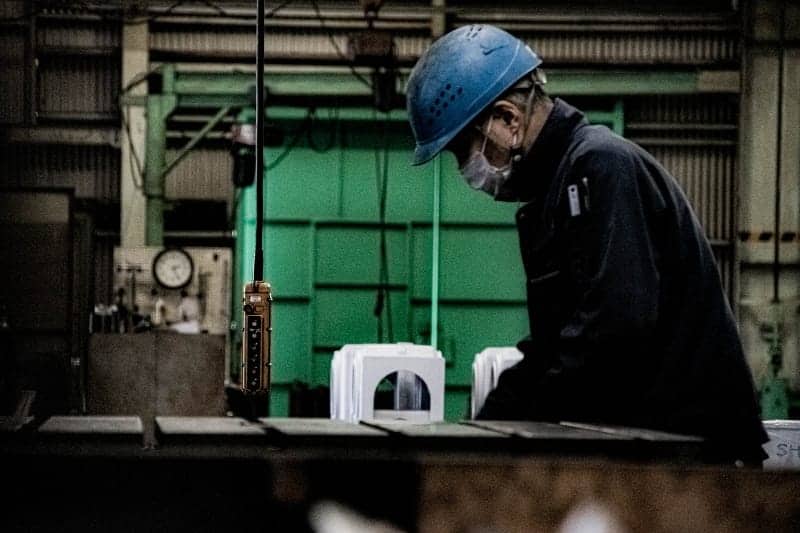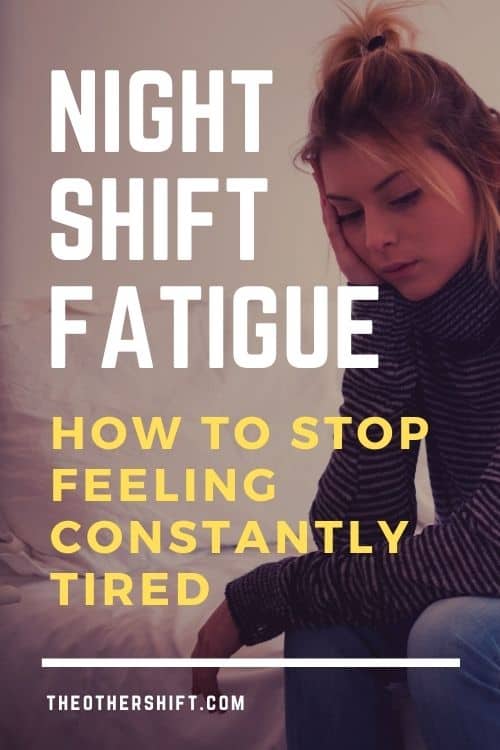Disclosure: This page may contain affiliate links, meaning we receive a commission if you decide to make a purchase through our links, but this is at no additional cost to you. Please read our disclosure and privacy statement for more info.
Fatigue is such a common part of working night shifts that many of us are guilty of trying to just push through it. But ignoring the signs and symptoms of extreme fatigue can interfere with health and happiness, by increasing the risks associated with exhaustion, including human error, disease, and mental illness.
Fatigue may be inevitable when working night shifts, but it can be mitigated by implementing fatigue management strategies both on-the-job and at home. These include; taking your breaks, adhering to mandatory rest periods between shifts, timed napping, using caffeine wisely and healthy eating.
Employers, workers, unions, and government agencies are all waking up to the cost of extreme fatigue, making “fatigue management” a bit of a buzzphrase these days. We wanted to jump on the bandwagon and ensure that our night shift community is also informed about fatigue and empowered with some helpful fatigue management strategies.
If you are interested in checking out the best natural sleep aid pills, you can find them on Amazon by clicking here .
.
Why Night Shift Causes Fatigue
Night shifts can take a toll on your energy levels for a number of different reasons. Some are more obvious than others, so we wanted to start off this article with a brief overview of why you feel so dang tired after working nights.
We think you may be surprised to learn how interconnected these causes really are.
Circadian Disruption
Circadian disruption is considered the leading cause of fatigue and sleepiness among night shift workers. Circadian disruption occurs when the body’s natural circadian rhythm is thrown into disarray by a night shift or swing shift schedule. (What’s the swing shift? Click here to find out more.)
Our natural circadian rhythm is dictated by genetics. Specifically, the Period and Cryptochrome genes, which code for proteins regulate our sleep and wake cycles throughout the day. Since our natural circadian rhythm is genetic, it is possible that some people are better adapted to work night shifts than others (night owls we’re looking at you).
That said, signals from the environment, such as daytime sun exposure, can also affect the circadian rhythm. This means that seasonal light changes can reset when your body switches on the Period and Cryptochrome genes. Either way, night shift workers have to fight their genetic programming in order to not feel tired at work, unless you live in one of the few places in the world that has midnight sun seasons.
Sleep Deprivation
Sleep deprivation is also a main reason for fatigue among night shift workers and it can be caused by a number of factors related to working the night shift including:
- Circadian rhythm disruption (See? Interconnected!)
- Daytime insomnia
- Daytime obligations that interfere with sleep
- Revenge bedtime procrastination
- Inadequate sleep environment (i.e. too much light or noise in your sleep space)
Of course, sleep deprivation rarely occurs at work, but if you are not able to get enough sleep between shifts, the sleep deprivation will come back to haunt you during your shift.
Ignoring ongoing sleep deprivation can have serious long-term impacts on your health and wellbeing because it can cause something known as Shift Work Sleep Disorder (SWSD).
Shift Work Sleep Disorder is associated with the following fatigue-based symptoms:
- Extreme fatigue
- Trouble concentrating
- Low energy levels
- Sleep that does not leave you feeling refreshed or rested
- Depression
If left untreated, Sleep Work Shift Disorder has been correlated with an increased risk of cancer, heart disease, and chronic illness.
Related post: Does Night Shift Shorten Your Life? 10 Impacts of 3rd Shift
What about Melatonin? If you are considering taking this dietary supplement to help you sleep or you’ve tried it before, take a look at the video below.
Physical Exertion
Whether you are working the night shift at the factory or pushing three-hundred-pound beverage carts through the isle on a red eye flight, a physically demanding night shift can absolutely leave you feeling extra fatigued (and probably a little sore) the next day.
On the one hand, staying active during your shift may help to stave off sleepiness, but once you slow down, it is liable to catch up with you. Especially since circadian disruption can lower your pain tolerance.
If you often find yourself coming home from work feeling like you’ve been hit by a ton of bricks, you may also be interested in: Why Does My Body Ache After Night Shift?
Vitamin Deficiency
Vitamin deficiencies can also contribute to fatigue, especially since vitamins support healthy hormone production, which in turn helps our body regulate sleep and wake cycles.
There are a few vitamins that are important to pay attention to when working the night shift. These include Magnesium, Vitamin D, and Vitamin B12.
Ensuring that you are getting enough essential vitamins and minerals is important because it can reduce the impacts of circadian disruption and help you manage your fatigue.
If you would like to learn more about vitamins we recommend checking out these two past posts:
Food Allergies
Undiagnosed food allergies can be contributing to your lasting fatigue more than you might think. When you eat something that your body is intolerant of two main things happen that can cause you to become lethargic.
First, your body will trigger an immune response, sparking inflammation and irritation. In response your body will produce cortisol to counteract the allergic reaction. Since there is a lot going on underneath the surface to correct for the food intolerance you will likely feel some fatigue.
Second, when your body triggers an allergic response it blocks its own ability to absorb antioxidants and nutrients from your foods, which can exacerbate the vitamin and mineral deficiencies we discussed above.
In this video I talk about the foods you should avoid to stop nausea and bloating overnight. Even during the making of this video I was surprised at the foods which can set you off!

Symptoms of Fatigue
Now that we have discussed the five main reasons that night shift workers experience fatigue, let’s talk about how that fatigue manifests. We identified five main symptoms of fatigue that are common among night shifters.
1. Sleepiness: This one is a no brainer. But it is important to keep in mind that extreme sleepiness is not normal and should be addressed if it happens to persist.
2. Brain Fog: Brain fog is a common symptom of fatigue. It can express itself as a headache, or an inability to focus.
You might be interested in: Shift Work and Headaches. How to Think Clearly Again.
3. Pain and/or soreness: As mentioned above sleep deprivation can cause your pain tolerance to go down, making it common for night shift workers to experience muscle aches and general pains, especially in their legs and feet!
4. Irritability: Fatigue can cause us to be grump monsters. So, if you find yourself extra depressed or irritable it could be a sign that you are extremely fatigued and need to rest.
You might be interested in: Tips to Staying Awake on Night Shift (and Avoid Grumpiness)
5. Cravings: Circadian disruption messes with your hormones, including those that control hunger signals. Thus, sleep deprivation can cause you to experience more cravings than usual.
You Might be interested in: Night Shift Food Cravings. How to Tame Them

Challenges of Fatigue
Perhaps we’ve always known that being fatigued on the job has its challenges, but as we pointed out above, employers, unions, and government agencies are finally waking up to challenges and consequences of having fatigued employees.
We took the time to explore a few here, but this is by no means an exhaustive list of fatigue-related challenges.
Human Error
Human error increases the more fatigued we become and some of us simply cannot afford to make mistakes on the job. Aviators, health care professionals, and first responders have people’s lives in their care, so the stakes are just too high to be making mistakes due to fatigue.
The FAA has known this for a while and has long implemented mandatory rest for pilots and flight attendants, but other industries are also starting to realize that there is too much to lose on tried employees and are beginning to implement mandatory rest for their employees to prevent errors from occurring during duty periods.
Increased Risk for Injury
When our bodies are worn down it is easier for us to accidentally injure ourselves while performing routine tasks, such as lifting people into wheelchairs or moving packages. Additionally, a tired body takes longer to heal after the fact.
If you have a physically demanding job, it is also possible for you to become physically fatigued, even if you are not mentally fatigued. Therefore, if you know your job demands a lot from your body it might be a good idea to have a trusted physical therapist in your corner to teach you how to stretch and care for your body both before and after work.
Lowered Productivity
When workers are fatigued they are less likely to be as productive as a well-rested employee. I think we all know this to be true, since we’ve likely all had to fight sleep on at least one occasion while working the night shift. Instead of being productive most of our energy and focus goes to simply keeping our eyes open.
Even mild fatigue can slow us down by contributing to brain fogs and headaches that impede our ability to do our jobs to the best of our abilities.

Economic Impact
All of these challenges ultimately impact the bottom lines of the industries we work for, which is why they are starting to pay more attention to fatigue in the workforce.
One study found that fatigue has an economic impact of over 400 Billion USD a year in the United States. That accounts for the cost of human error, the cost of workers’ compensation for on-the-job injuries, and the lost profits from decreased productivity.
To illustrate this a little more let’s explore a few examples:
Cost of Human Error
Continuing the theme from above, in the aviation industry, there is little room for human error. Fatigued flight attendants, however, are known to accidentally deploy the evacuation slide instead of disarming it after arriving at the gate.
Known as Inadvertent Slide Deployment (ISD) each instance can cost an airline about 50,000 USD, and has even resulted in damage to aircraft, ground equipment, and injuries sustained by the ground crews.
Cost of Injury
Most employers provide some kind of compensation when their employees are injured on the job and it can become quite costly if fatigued employees are injuring themselves often. This is often billed as an insurance policy but, the more often claims are made due to injury the more a company’s premiums will go up
Cost of Lowered Productivity
Most employers profit off their worker’s productivity. Therefore, it makes logical sense that employees impacted by fatigue will be less productive and make less money for the company.
Fatigue and lowered productivity can also result in low company morale. Tired and overworked employees are less likely to experience job satisfaction and it may result in a high turnover rate for companies that then have to invest more money into training employees.
Most employers that are starting to wake up to the impacts and challenges of fatigue at work are motivated by the economic impact of fatigue.
We are not advocating for the increased demands on worker productivity but understanding your employer’s economic perspective may help you advocate for better working conditions and better workplace fatigue management supports.
With that, let’s take a look at some fatigue management strategies.

Fatigue Management Strategies for Working Night Shifts
There are a number of strategies you can use during your night shift to help lessen the effects of fatigue and prevent errors, injury, and lost productivity.
Take Your Breaks
Can we get a show of hands, how many of you have worked through your breaks instead of taking a moment to rest? Too many of us!
You may think you are being helpful to your coworkers by staying active during your breaks, but you need to take care of you. A fatigued colleague is not as much help as a rested colleague!
You don’t have to be idle during your breaks but use this time to recharge in a way that works best for you. Some ideas for restful ways to use a break at work include:
- Listen to a podcast you enjoy
- Go for a powerwalk
- Do a guided meditation
- Watch an ASMR (autonomous sensory meridian response) video. I found it a bit odd but strangely relaxing
- Stretch out or relax tense muscles
- Take a power nap
Power Napping at Work
That last suggestion for ways to use your break is something that is particularly useful for night shift workers who are fighting something known as sleep pressure. Power naps, when taken strategically, can boost your memory, productivity, and problem-solving abilities that may otherwise be impacted by fatigue.
We wrote a whole guide to power napping effectively during the night shift. Check it out, The Night Shift Power Nap: What You Need to Know.
To quickly summarize some key points from that post, your power naps should last between 10 and 30 minuets to prevent sleepiness after your nap.
Our power nap guide also provides you with some great ideas for setting up the perfect napping space at work, even if your employer is not nap-positive.
The key to a good power nap is an eye mask. Dan and I rave about these ones.
Stay Active & Engaged
Some night shifts can be a bit slow when it comes to workload, leaving night shifters feeling unengaged, which can also lead to sleepiness. Finding ways to stay mentally engaged during your night shift can help the time pass more quickly.
We recommend bringing something you find engaging to work with you if you know you are going to have to pass time during down-periods. Some ideas for mental stimulation include:
- Use Duolingo to learn a new language (if use personal electronic devices are allowed)
- Read a book you enjoy
- Try picking up embroidery
- Bring an activity, puzzle, or coloring book to work with you
Related post: Bored on Night Shift? How to Stay Busy Without the Internet
Pack Healthy Food
Packing healthy, energizing foods can make all the difference when it comes to fighting fatigue during the night shift.
Foods with high sugar contents are likely to cause you to crash, so it is best to avoid these types of foods and opt for complex carbs and proteins that will give you a lasting source of energy during your shift.
If you need ideas for good foods to pack for work, we have a few posts that may help you out:
- Healthy Meals for Shift Workers (with Recipes and Videos)
- Vegan Snacks to Satisfy Any Famished Night Shift Worker
- 9 Shift Work Meal Ideas (Easy and Freezable)
Use Caffeine (As A Last Resort)
Caffeine is a double-edged sword when it comes to night shift workers. On the one hand it can provide that much-needed boost of energy and mental clarity, on the other it could lead to further sleep deprivation by making it harder for you to sleep between shifts.
We tend not to recommend the habitual use of caffeine for the very reason that it is bad for your sleep hygiene, but there are occasions when caffeine can be a great tool.
A pre-shift “coffee nap” could be a useful way to manage fatigue during your shift. It involves consuming between 80-200 mg of caffeine before lying down for a power nap. The idea is, your will reap the benefits of a power nap, while the caffeine kicks in, preventing the post-nap sleepiness you might otherwise encounter.
However, once your shift starts, caffeine consumption should be reduced to prevent insomnia after your shift.

Limit Your Overtime
Overworking yourself is absolutely going to wind up causing fatigue. Mandatory overtime should be limited as much as is within your control, and of you are opting to do voluntary overtime you should limit how often you elect to work overtime.
The Occupational Safety and Health Administration (OSHA) makes the following recommendations:
- Limit overtime to 4 hours when tacked onto 8-hour shifts.
- Limit overtime to 2 hours when tacked on to a 10-hour shift.
- Do not allow overtime on any shift longer than 12 hours.
The idea is to limit total duty periods to 12 hours. So that weekly total hours do not extend beyond 55 hours.
These guidelines are meant to be followed by your employers. Though we do realize that some occupations are organized differently and do have much longer duty periods. In this case your employer should follow guidelines for mandatory rest.
If you are asked to do overtime, you are within your rights to ask for only a few extra hours and not an entire other shift. There is no harm in asking I say!
Adhering to Mandatory Rest
Many first responders and aviators have much longer duty periods because they are not actually going to be actively working that whole time.
A duty period for these folks can be up to 15 hours, but these folks can theoretically rest or nap between emergency calls or flights, and employers are able to get away with the extended days. The tradeoff is a mandatory amount of time off between shifts and per week.
According to a close source who works as a flight attendant, US-based stews are afforded 10 hours of rest between duty periods and must take a full 24-hour period off every 7 days. Neither the employee or the airline may schedule flying until the rest requirement has been met.
If you work in this type of occupation it is important to actually use your rest time to rest.

Fatigue Management at Home
Truth be told fatigue management starts at home. The best way to prevent on-the-job fatigue is to ensure you are getting enough rest between shifts.
Get Enough Sleep
OSHA recommends that shift workers get at least 7-8 hours of sleep for each 24-hour period, and at least 50 hours of sleep for every 7-day period.
But we know it can be tricky for night shift workers to get quality sleep when you are forced to sleep during daylight hours. Sleep is such a big challenge to night shift workers we dedicate a lot of time on this blog to helping shift workers sleep better.
Here are a two of our past posts on this topic that we think could be helpful if you are having a hard time getting enough sleep.
- Shift Work Bedroom Ideas. Creating the Ultimate Sleeping Oasis.
- How to Sleep Fast in 5 Minuets. 13 Tips to Get You There.
Get Active
Maintaining your physical health by staying active will also help you manage your fatigue. Exercise is great at boosting overall energy levels and is also helpful when it comes to maintaining good sleep hygiene because it can reduce your risk for insomnia.
Check-in With Your Nutrition
Above we talked about how vitamin deficiencies and food allergies can contribute to fatigue symptoms. Scheduling time with a nutritionist that can help you identify your needs can be really helpful for night shift workers because it can help you understand which vitamins you may need to supplement.
It can also help you find foods that will help you stay energized at work, while also making clear which foods you need to avoid.
Resources and Advocacy
Fatigue sucks and if your employer is not sensitive to the fact that their employees are fatigued you may need to advocate for yourself to get the protections you need.
There are a number of resources available to shift workers that can support you if you should choose to push for more fatigue considerations at work. These resources include:
- Unions: If you work for an industry with union membership, unions are a great place to start if you would like to advocate for better fatigue management supports at work.
- Education: Educating yourself and your colleagues about fatigue management can go a long way towards mitigating the effects of on-the-job fatigue.
- Government Regulation: There are a number of government agencies, like OSHA, that regulate things like shift duration, mandatory rest, overtime, etc. If you are familiar with the regulations, you will be able to advocate for yourself by holding your employer accountable to the labor laws of your country.
Worker advocacy has done a lot for society, so don’t be afraid to speak up for yourself if you feel your fatigue is the result of an exploitive workplace.

Final Thoughts: Night Shift Fatigue. How to Stop Feeling Constantly Tired
Fatigue may be commonplace among night shift workers, but extreme fatigue should not be tolerated.
If you find yourself experiencing long-lasting fatigue related to your shift work, you should be sure to work with your employer to develop a fatigue management strategy and prioritize your own self-care when it comes to sleep hygiene and rest.
Cheers,

Disclosure: This page may contain affiliate links, meaning we receive a commission if you decide to make a purchase through our links, but this is at no additional cost to you. Please read our disclosure and privacy statement for more info.

Resources:
- “What Workers and Employers Can Do to Manage Workplace Fatigue during COVID-19.” Centers for Disease Control and Prevention (CDC). Web.
- “Fatigue Management – OSHA Occupational Health Services Australia.” Occupational Health Services Australia (OSHA). Web.
- Vargas, Susan. “Waking up to the risks of workplace fatigue.” Safety + Health. Aug 25, 2019. Web.
- Nichols, Hannah. “Life hacks: How to cope with night shifts.” Medical News Today. Fact checked by Jasmin Collier. Oct 30, 2017. Web.
- Akerstedt, Torbjörn and Kenneth Wright Jr. “Sleep Loss and Fatigue in Shift work and Shift Work Disorder.” In Sleep Med Clin. Vol 4. No. 2, (2009), 257-271. Web.
4 thoughts on “Night Shift Fatigue. How to Stop Feeling Constantly Tired”
Leave a Reply
Recent Posts
An examination of the night shift professions, that while sometimes underappreciated, are necessary for civilization, in its current form, to exist. A city can be thought of as a machine. Each...
Culminated from an exhaustive yet well-funded journey into the night, this article will prepare you for life outside of work while being a denizen of the dark. During days off, night shift...


This is Awesome and helpful advice????
Thanks Josh! We are glad you enjoyed it.
I find that my problem is not fatigue at work, but fatigue on off days. I work 7pm-6am, Mon-Fri. On these 3 day weekends I find that by trying to “flip” my sleep schedule (no one wants to sleep all day on your precious few days off) it completely backfires and I am constantly tired. I try and take a nap and it turns into 8 hours of sleep! The only solution, it seems, is to try and maintain my nite shift schedule on off days. I end up being up all nite with nothing to do, very little human contact, watching infomercials until morning. This is no way to live. It takes away from so many facets of living a normal healthy life. I have a really good job, which I love, but am faced with the reality that the only way to get my quality of life back is to quit and that just isn’t practical financially. There must be a way that I can coexist with the daytime world on my off days without feeling like the walking dead. I am truly at my wits end and dont know that a solution exists to be able to live like this long term.
Hi Lucas,
Thanks for your honesty. It’s a really tough situation. I agree that staying on a night shift schedule is probably the best “body clock friendly” way of going about it but it’s the least social option. Can you do a hybrid type sleeping model on your days off? Can you go to sleep at 4am and wake up at 12pm? Intense exercise on Saturday and Sunday, with no caffeine/alcohol (or timed 6 hours before bed) with healthy foods and lots of water (with sleep aids/relaxation strategies) can help you feel sleepy. Is there a way you could work 12-hour nights 4 days a week? Can you switch to the day shift for a month or two? Can you discuss this with your manager to find a solution? Best of luck Lucas.